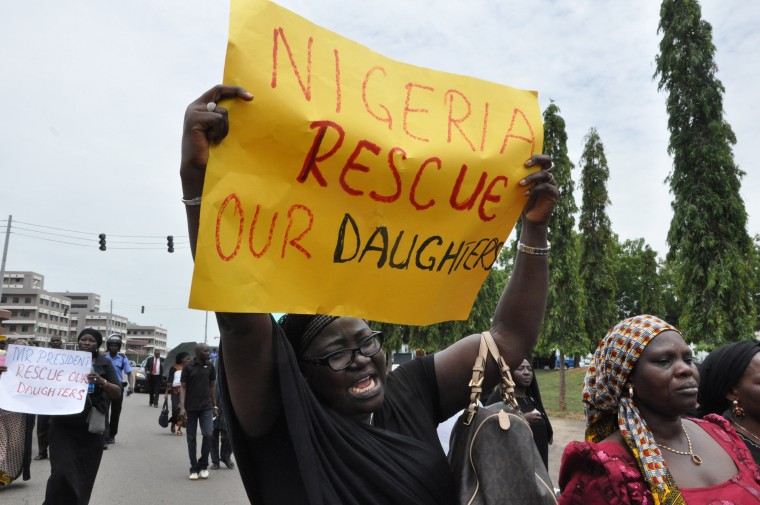Two weeks have passed since the militant group Boko Haram abducted 234 school girls from their boarding school in northern Nigeria.
The teenage girls, who range in age from 16 to 18, were taken from their dormitories at the Government Girls Secondary School in the town of Chibok on April 14 and taken away by trucks in the middle of the night. There are now reports that indicate the school girls, who were thought to be held hostage in the Sambisa Forest, have been sold as brides to Islamic militants for 2,000 naira, or $12.
Nigerian officials have confirmed the teenage girls were kidnapped by Boko Haram, but have not yet confirmed if they have been sold as brides.
"We have heard from members of the forest community where they took the girls," said Samson Dawah, whose niece Saratu was among the 234 girls abducted by militants. "They said there had been mass marriages and the girls are being shared out as wives among the Boko Haram militants."
"My wife keeps asking me, why isn't the government deploying every means to find our children," Dawah said.
Nigerian President Goodluck Jonathan's administration has been under enormous pressure from the parents of the students and the international community. Jonathan has said his security forces are doing all they can to locate and safely bring the girls back home.
A day after the abduction, the Nigerian military reported they had "freed 107 kidnapped female students," but retracted their statement as the few girls who were able to escape did so on their own without military assistance.
"The operation is going on and we will continue to deploy more troops," Defense Ministry spokesman Maj. Gen. Chris Olukolade told the Associated Press last week.
Boko Haram, whose name means "Western education is forbidden," has been called one of the most murderous extremist organizations in the world for killing nearly 4,000 people in the last five years, according to Amnesty International. That number includes about 1,500 people who were killed in the first three months of 2014 alone.
The Christian-Muslim conflict has continued to escalate in Nigeria, Africa's most populous nation. The ongoing religious and ethnic conflict has intensified between the northeastern region of the country, which remains an opposition stronghold, and the southern region where Christian ethnic groups have been persecuted by Muslim extremists from the north.
The militant group advocates enforcing Sharia law and opposes education. Sixteen-year-old activist Malala Yousafzai, who was shot by the Taliban in Pakistan for speaking out in favor of education for girls, commented on the Nigerian kidnappings and underscored how the militants have misinterpreted the Quran.
"I know there are some militants who are misusing the name of Islam and they’re saying that education is not allowed, but I would just tell them the Prophet, peace be upon him, he said that education is the duty of every Muslim, whether he’s a girl or he’s a boy," Yousafzai told the BBC. "So if Prophet says it, how can you deny it? And if God is allowing girls and boys to get education, how can you deny this right?"
"Islam allows us to go and get knowledge and to go and get education so how can some militants deny this fact," she said.
Some school girls were able to jump out of of the trucks and escape. According to one, the militants who raided the school dressed in military uniforms and promised the girls they would be safe.
"They said, ‘Don’t worry. Nothing will happen to you,'" Deborah Sanya told The New Yorker.
"When the men started shooting their guns into the air and shouting 'Allahu Akbar' ... she realized that the men were not who they said they were," the author wrote.
"I thought it was the end of my life," Sanya said by phone on Monday from Chibok. "There were many, many of them."
A village elder in Chibok, Pogo Bitrus, told the news agency Agence France-Presse that "various sources" have been tracking the movements of the girls.
"From the information we received yesterday from Cameroonian border towns our abducted girls were taken ... into Chad and Cameroon," Bitrus said.
Activists have used the hashtag "BringBackOurGirls" on Twitter to put pressure on the Nigerian government, and hundreds of people marched through the capital of Abuja in the Million Woman March on Wednesday.
"For how long are we going to wait for the government to help us? We can't bear it anymore ... We just want the government to help us, we want the world to hear this and help us," a participant told United Press International.
